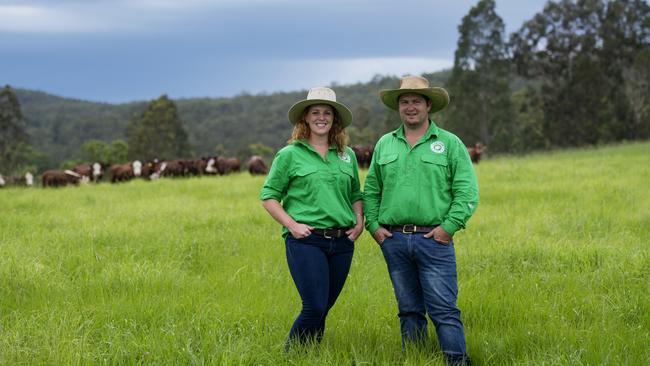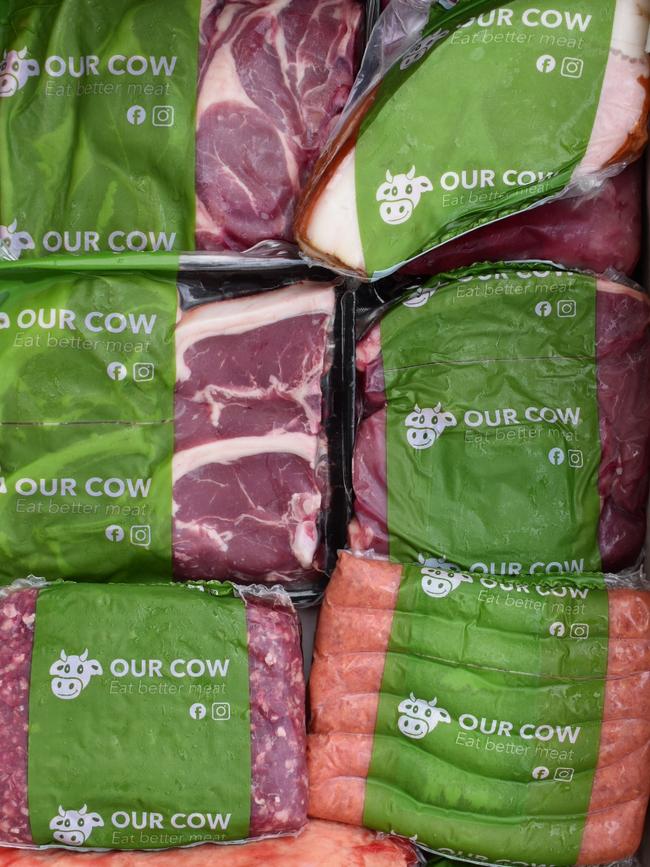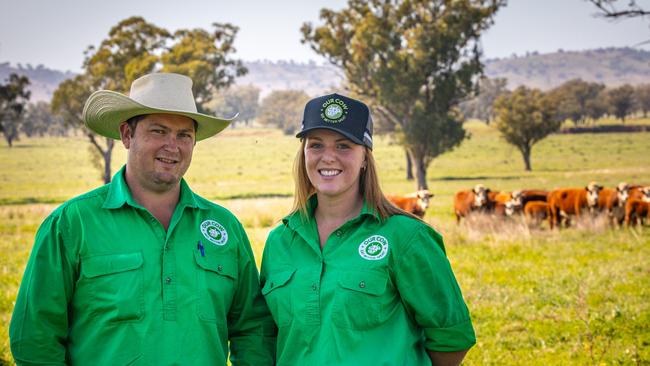Meat subscription: Our Cow founders Bianca Tarrant, Dave McGiveron
Here’s how one farming couple went from being worried they’d lose the farm to revenue of $10m-plus in three years.
From necessity, comes invention — or in this case innovation.
And while many people before them have sold meat direct from farm to consumer, no-one in Australia has quite done it the way Bianca Tarrant and her partner Dave McGiveron have.
Horrific bushfires and a terrible drought were the catalysts for the farming couple to start a Facebook page in 2019 to try and sell their beef from.

Fast forward three years and their business-to-consumer meat subscription service, Our Cow, delivers meat to more than 5000 subscribers every month, it has gone from zero to $10 million in revenue and they recently undertook a successful capital raise of more than $2 million.
THE PRICE IS RIGHT
The young couple purchased their 810ha farm at Baryulgil in the Clarence Valley, in north eastern NSW in 2017, where they set about running a beef cattle herd.
“We went out on quite a limb to purchase our farm, we are young and it is quite difficult for young people to get into agriculture and purchase a block of land. We’d taken that risk to start with and had to go into further debt to stock the place with livestock,” Bianca said.
Already in a difficult financial situation, combined with the “horrific” 2019-2020 drought, and having 70 per cent of their farm burnt during the 2019-20 summer bushfires, the couple said it “got really hard”.

“As a farmer you never really know what price you are going to get for your livestock we couldn’t afford to keep not knowing that and taking losses for our livestock,” Bianca said.
“So we thought we need to do something different, we need to do something where we can guarantee ourselves a price, otherwise we are probably going to lose the farm.”
They figured the price of meat at the retail level didn’t fluctuate anywhere near as much as the price at the saleyard, so they decided to try selling some of their meat online and started a Facebook page in mid-2019.
“It just grew from there.”
While they had intentions of just selling their own meat, it sold out so quickly, they started connecting with other farmers in the area in the same position who wanted stability and consistent prices.
And it was from this point the couple realised Our Cow was much bigger than just them.
“We wanted to help farmers across the country get a fair price for their livestock and connect them to where their food goes.”
Initially they connected with farmers in their local area, but demand from consumers kept growing, to where it is today so they had to expand their suppliers.
BEEFING IT UP
There are now 100 farmers across NSW and Queensland supplying Our Cow with their meat.
Having started with just beef, Our Cow now offers it all — including grass-fed beef and lamb, organic chicken and free range pork.
Our Cow now has about 5000 subscribers who are delivered meat every month and in total the business has delivered to about 40,000 homes across Australia.
While Our Cow delivers a selection of meat in a box, once or every two, four or six weeks, they also launched an ongoing subscription last year, called the Exclusive Eaters Club.
It delivers grass-fed and organic meat to customers every two, four or six weeks.
“It’s just like a wine club, but for meat.”
The subscription box works out to be about 20 meals, and is completely customisable.
Bianca said she believes demand is so strong due to the quality of the product and the fact consumers know they are directly supporting Aussie farmers.
“It’s some of the best produce you can buy and the money they are paying for their meat, they know is going straight to the farmers who they feel really connected to,” she said.
Being able to have a secure food supply has also been a factor in their quick growth.
“In the last couple of years we’ve seen supermarket shelves run bare, due to Covid, and our customers were really fortunate they were able to have consistent food supply during those times.”
Convenience of having meat delivered directly to their door, which is vacuum sealed into meal size portions — meaning some products can be kept fresh in the fridge for 40 days, rather than taking up freezer space — are other wins for customers.
And while it may sound exclusive and expensive, Bianca said their prices were comparable to grass-fed lines of meat in the major supermarkets.
“There might be one or two products that are different but it is not significant, and some of our products, like lamb forequarter chops and mince are cheaper.”
BIGGER THE BETTER
So how does a business that was aiming to sell one body of beef, end up selling tonnes of meat a week?
“There are a lot of farmers that sell their own beef or produce, but something both Dave and I wanted from the start was for this to be bigger than ourselves,” Bianca said.
“If it was just about selling our own produce and our own meat, we would be shut by now because we ran out of our own beef within the first month.”
She said they wanted to bring stability, consistency, stable prices and some security to other farmer’s operations.
“We know what it is like, your input costs don’t change. Whether you are in a drought or it is raining, it still costs the same amount to raise an animal and consumers don’t understand that.”
So once they realised there was an appetite for what they were doing Bianca said it was about making the business bigger than “just us”.
Having started out processing the meat in a butcher shop they were leasing, the couple have since started a processing plant in Casino, which employs 40 people, making them a significant employer in the region.
Bianca said they got to a size where they couldn’t process in the butcher shop, so they needed to have their own plant for scalability. It also gives them full control of the supply chain.
While the livestock are still killed at an abattoir, all meat is processed at the Casino plant and dispatched daily.
Every label has the farmers name on it, so when customers receive it, they can look on the Our Cow website or social media to see information about them.
“It is about putting a face behind it and traceability as well. People want to know they are actually supporting somebody and it is so much more powerful when there is a face to it, a feeling and an emotion,” Bianca said.
The environmental and sustainable impact of grass-fed, free range or organic were also big selling factors.
“Our customers know they are having positive impact on the climate by sourcing their meat from us and our farmers.”
QUALITY COUNTS
Farmers themselves, Bianca and Dave run 200 cattle, including more than 100 Shorthorn breeding cows.

Having worked to improve the water supply on their property in the past few years, Bianca said their focus was ensuring the cattle have lots of fresh grass, clean water and plenty of space to roam free of stress and contaminants.
While they previously ran other breeds, Bianca said since starting Our Cow they realised the quality of the meat is what really mattered.
“Many farmers are interested in frame, size, and kilos per day but it isn’t about that for us and our job — we want meat quality, we want softness and carcass yield,” she said.
So they are the qualities they breed for and what they look for in the livestock they are supplied.
“We changed our operation to Shorthorns so we can supply better meat to Our Cow. Shorthorns are renowned for marbling.”
She said they marble well off grass, with their average marble score sitting at about +3.
All steers were processed at milk-tooth age for Our Cow, heifers were mostly kept as replacements, and all cattle are run under a rotational grazing system.
The mixed pastures were planted down to rhodes grass, then oversewn with winter feed such as oats or rye grass.
The average annual rainfall on the property is 1200mm, but this year they had already received more than 3 metres of rain.
CAPITAL IDEA
To ensure they can continue to expand, Bianca and Dave recently undertook a capital raise, raising more than $2 million through VentureCrowd, a crowd source funding arrangement.
“When Dave and I started the business we had nothing and it was just us. It grew so quickly to a point where we knew there was potential in the marketplace for this to continue to grow,” Bianca said.
Knowing they didn’t want to stop, she said they needed more capital to continue to fund the growth and inventory and stock they needed to have on hand, to be able to fill orders in a timely fashion.
“People want instant delivery, so we have to have enough stock on hand to be able to do that,” she said.
“We are in a really unique space, we are leading the market at the moment in the online meat delivery market and we don’t want to lose that position. A lot of the capital we have raised will be going directly into marketing to be able to continue the growth trajectory we are on.”
VentureCrowd chief executive Steven Maarbani said one of the biggest challenges for businesses is funding at the growth stage and his company “digitises the process of raising capital at that growth stage”.
Steven said they like to take “positions on meaningful themes” and one of those was ag technology, which is where Our Cow came in.
“They are genuinely authentic founders which investors resonated with, and the product is something customers really want,” he said.





